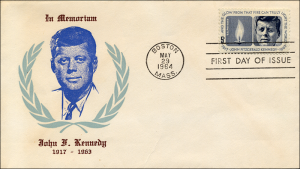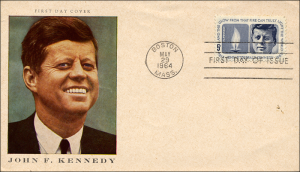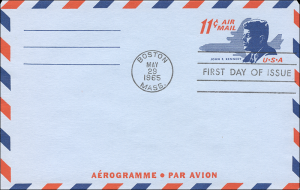
Seven score and 10 years ago, the President of the United States gave a speech that lasted about two minutes. The featured speaker at the cemetery dedication went on for two hours.
“The world will little note, nor long remember what we say here,” Abraham Lincoln said, but he was wrong: Today, the “Gettysburg Address” is considered one of the greatest in American history. It’s also quoted, and parodied, throughout our history and literature.
On the other hand, maybe Lincoln was thinking of the U.S. Postal Service. We have at least two stamp issues coming out this year on November 19th, the 150th anniversary of the speech, but none is for that event. Instead, we’re getting two crassly commercial issues: Harry Potter and Hanukkah.
Lincoln wasn’t Jewish, and couldn’t play Quidditch worth a darn, so I can’t see servicing Gettysburg Address Sesquicentennial covers with any of those stamps.
Now don’t get me wrong: I’m looking forward to both of those issues, even though I know they’re pandering to specific non-philatelic audiences. Jews will buy the Hanukkah stamps because, well, they’re not Christmas stamps and some send out cards for this minor holiday because Christians send out cards for their holiday. (Has the U.S. Postal Service ever considered stamps for the Jewish High Holy Days, Rosh Hashanah and Yom Kippur, the major holidays when Jews also send out cards? No, I didn’t think so.)
When I first head of the Harry Potter issue, in a blind listing in a stamp program chart in the Postal Bulletin, I thought, okay, the books spurred adolescents in this country to read voraciously. Since then, I’ve been told the stamps feature the movies, not the books, and I’m finding it harder to justify. At author J.K. Rowling’s insistence, nearly all the actors in the movies are British. The locations are British, too.
Then we were told the location for the first-day ceremony, and the light dawned: It’s in Orlando. No location within that city was mentioned, but “The Wizarding World of Harry Potter” at Universal Orlando Resort is there. What a coincidence!
Universal has already announced a major expansion of the Harry Potter attraction for some time in 2014. Although the USPS is rushing out the stamps on November 19th — a date apparently set by the Potter people — they won’t be universally available (sorry) until January, when there will be another big media push for the stamps. Another coincidence!
So what’s on November 19th? Just a wild guess, but a press release on the Universal Orlando Resort media website says the Hogwarts Express locomotive is now in place, and will carry patrons between different parts of the Harry Potter attraction. Perhaps November 19th is the day that train service begins.
However, that the Postal Service seems almost desperate to sell stamps isn’t the point of this essay. The stamp that it’s not issuing is: The Sesquicentennial of the “Gettysburg Address.”
Amid the 16 varieties of flag stamps, more than a dozen flower stamps, 12 construction stamps and the rest of this year’s bloated issue program, wasn’t there room for one more historical issue? I count six this year (Battles of Gettysburg and Vicksburg, Rosa Parks, Battle of Lake Erie, West Virginia Statehood, March on Washington), six if you throw in the Grand Central Terminal Express Mail stamp (it opened in 1913).
Unfortunately, there is precedent for a lack of respect for the “Gettysburg Address:” The only other stamp the U.S. has ever issued for the speech was in 1948, the 85thanniversary. That was a year in which even chickens got a stamp, so it was no big honor. There was no stamp for the centennial in 1963.
That year, and this year, we had stamps for the Battle of Gettysburg, a turning point of the Civil War. But those stamps commemorate death and destruction. Why no stamps for great public speaking? Great statesmanship? Great leadership?
I hate to sound like one of those fuddy-duddies 16 years ago who began every complaint about stamps that weren’t issued with, “We have a stamp for Bugs Bunny, but not �:” And I’m looking forward to the Hanukkah and Harry Potter stamps. I plan to service my Dragon Cards first day cover cards for both issues.
But I’m also going to service Dragon Cards for the Gettysburg Address. They just won’t be first day covers of a stamp commemorating the speech.

 My local paper has been running a “Where were you on November 22, 1963” features this month. Like most of us, I know exactly where I was, and it has a philatelic connection, but I’ve always had misgivings about it. But, after reflecting on the significance of the date, and real
My local paper has been running a “Where were you on November 22, 1963” features this month. Like most of us, I know exactly where I was, and it has a philatelic connection, but I’ve always had misgivings about it. But, after reflecting on the significance of the date, and real izing that we can’t hold a 10-year-old boy to adult standards, I’ll tell the story.
izing that we can’t hold a 10-year-old boy to adult standards, I’ll tell the story. and, just like adults then and now, our weekly “hobby time” stamp sessions had become largely buy/sell/trade sessions. Mrs. Meade wasn’t happy about that.
and, just like adults then and now, our weekly “hobby time” stamp sessions had become largely buy/sell/trade sessions. Mrs. Meade wasn’t happy about that. We never had hobby time again, reinforcing my suspicion.
We never had hobby time again, reinforcing my suspicion.

 “Computers,” of course, covers a wide range of subjects. No one does everything related to computers well. I think I do some really well, others about average, but then there are the ones that drive me crazy.
“Computers,” of course, covers a wide range of subjects. No one does everything related to computers well. I think I do some really well, others about average, but then there are the ones that drive me crazy. My wife once asked me how I became so good at using the computer. (She said it, not me.) I told her I wasn’t afraid to try something, then reboot the machine after it crashed, and try something else.
My wife once asked me how I became so good at using the computer. (She said it, not me.) I told her I wasn’t afraid to try something, then reboot the machine after it crashed, and try something else.

